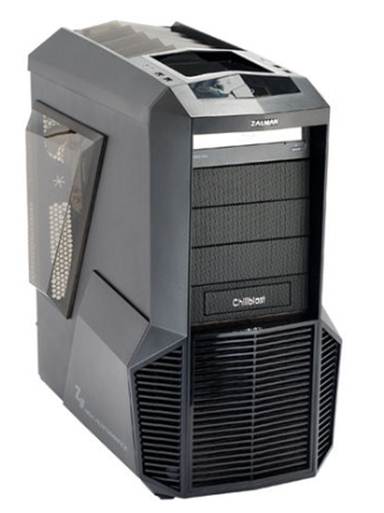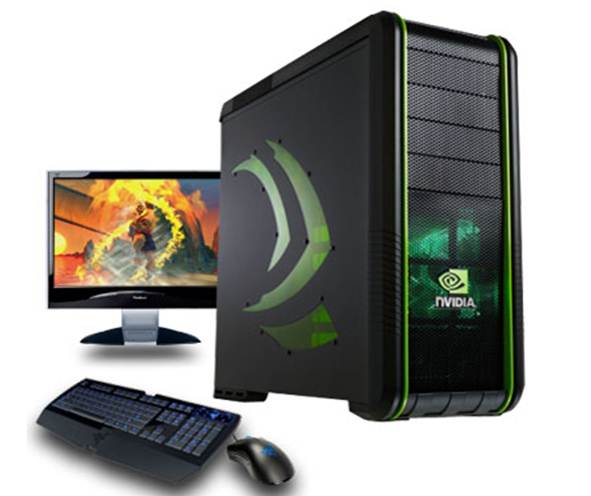Super test: Chillblast Fusion Thunderbird

The chillblast machine is one big, fat
beastie. The chunky Zalman chassis gives it a real sense of presence on your
desk, and the internal goodies match that sense of scale, with a heftily
overclocked i5 CPU and similarly overclocked GTX 670 doing the graphical grunt
work.
Sadly though, it’s in the overclocking
department that the Fusion Thunderbird gets a serious black mark. The Core i5
3570K gets a headline-grabbing 4.8GHz clock speed – easily the highest clocked
chip in the speed, we’d be all over this rig like a cheap LED strip.
Unfortunately, while it boots happily with these settings and will allow you to
navigate around Windows with impunity, as soon as you start stressing the chip
it begins to through either Cinebench or X2664 encoding test without it
crashing.
All it took was a quick trip to BIOS land,
knocking the multiplier down a notch, to hit a rock-solid 4.7GHz. if the CPU
couldn’t run under load at that clock speed, the rig shouldn’t have arrived
with those settings. It’s a shame, because we’ve only had good experiences with
Chillblast machines in the past, but if you’ve just spent $1.5k on a machine,
the last thing you want it to do is fail under load.
That aside, things are decidedly rosy for
the Fusion thunderbird. This rig has one of the most balanced spec sheets out
there, weighing up straight-line gaming performance with general PC
functionality. Part of the reason the machine functions at all at 4.8GHz is
because Chillblast has used a very strong Asus motherboard where others have
used more budget-oriented options. It has also opted for an overclocked Palit GTX
670 Jetstream in the graphics slot, which delivers frame rates practically on
par with those posted by the two machines with GTX 680 cards inside. It’s still
short of performance compared with the overclocked HD 7970 of the AdvanceTec
rig, but then you also get the added loveliness of things like PhysX and TXAA
with the Nvidia cards.
A fit
state
One of the big bonuses of this rig is that
it’s one of only two PCs in the test with a chunky 240GB SSD as a main OS
drive. It’s also got a 1TB HDD backing it up for all your data needs, but with
that decent SSD installed you could get a large chunk of your current gaming
library on those solid state memory chips without things getting too crowded.
The Scan machine, the other PC with a 240 GB SSD, has a weaker graphics card,
and therefore falls well short in the gaming benchmarks. That Mushkin SSD also
helps the Fusion Thunderbird get the fastest boot time of the lot.
If it wasn’t for the major black mark
around the overclock, this review would be sickeningly glowing. Chillblast has
found an excellent balance between the speedy GTX 670, i5 CPU and 240GB SSD.
It’s not the fastest rig in the test, but it has been intelligently
specced-out, despite the Blu-ray drive, and no mistake. You can’t argue with
that impressive two-year warranty either; good work, Chillblast.
|
Vital Statistics
|
|
Price:
|
$1,500
|
|
Manufacturer:
|
Chillblast
|
|
Web:
|
www.chillblast.com
|
|
CPU:
|
Intel Core [email protected]
|
|
Motherboard:
|
Asus P8Z77-V
|
|
Memory:
|
8GB Mushkin Essential
|
|
Graphics:
|
Palit GTX 670 Jetstream
|
|
SSD:
|
240GB Mushkin Chronos
|
|
HDD:
|
1TB Seagate
|
|
PCFormat
Verdict
|
4.5/5
|
|
Features:
|
4.5/5
|
|
Performance:
|
4.5/5
|
|
Value:
|
4.5/5
|
|
If it wasn’t for the OC fail, Chillblast
would’ve won easily, but the last thing you want is for it to fail under
load.
|
Super test: Cyberpower Infinity Apollo

Fans of the big green graphics company
rejoice, Cyberpower is showing its love of all things Nvidia here with a rig
that’s ripe for the fanboys. The SI has put some decent parts together for your
pleasure, all of which are bathed in the eerie, mushypea glow of the Cooler
Master 690’s LEDs.
We say ‘decent’, because we’re not entirely
enamoured with Cyberpower’s choice of components. It’s the choice of graphics
card that really has us stumped. We know that it’s a new graphics card, but the
GTX 660 Ti really isn’t the sort of component we’d want in a rig we’d just paid
a grand for. That’s especially true when we’re seeing overclocked GTX 670s, GTX
680s and an overclocked HD 7970 in the other machines.
Scan was the only other system integrator
to opt for Nvidia’s mid-range make-weight, and together they prop up our list
of gaming benchmarks. Up against the superior GPUs of the other rigs in the
test, the GTX 660 Ti loojs very, very weak.
Still, it means Cyberpower has been able to
stick a Blu ray drive in the rig, and we all know how useful they are for
gamers. To be fair though, the cost of a Blu-ray ODD is probably not that much
more than a DVD drive these days, so we can’t be too harsh on it.
Strong
SSD
The cash frees up by going for a weaker GPU
has arguably gone into the choice of solid state drive. At 128GB, the Crucial
M4 boot drive certainly isn’t vast, and will only let you install a few of your
most frequently played games, but it’s nevertheless one of the strongest SSDs
in the test. It offers fantastic 4K random read/writes in the AS SSD benchmark,
and delivers excellent boot times.
Along with the AdvanceTec rig, it’s also
one of only two in this test to use water-cooling on its overclocked processor,
and like the AdvanceTec, it actually has a relatively conservative overclock
applied to it.
At 4.5GHz its i5-3570K is certainly no slouch,
but 4.6GHz is what we’ve come to expect from even the lowliest Z77 motherboard.
This build is hanging out around the bottom of the CPU performance charts, and
with a high quality liquid chip chiller installed in that glowy chassis, we
were expecting more.
Lack
of love
We can’t help but feel a little
disappointed by this latest Cyberpower system. With its bold and brash Nvidia
branding, we’d have expected graphics to have been one of the components it
prioritized above the others. Sadly, by going for the GTX 660 Ti, Cyberpower
has left the machine languishing in the benchmark doldrums.
With the slightly conservative overclock on
the i5 CPU,combined with the weaker GPU, the Infinity Apollo comes up short
almost across the board. Only the decent showing by its choice of SSD gives it
any semblance of pride against the competition. This is by no means a poor
gaming PC, but if you’re thinking of spending this much money, the majority of
the other machines in the test would get our vote.
|
Vital Statistics
|
|
Price:
|
$1,500
|
|
Manufacturer:
|
Cyberpower
|
|
Web:
|
www.cyberpowersystem.co.uk
|
|
CPU:
|
Intel Core [email protected]
|
|
Motherboard:
|
MSI Z77-G43
|
|
Memory:
|
8GB Kingston HyperX
|
|
Graphics:
|
Nvidia GTX 660 Ti
|
|
SSD:
|
120GB Crucial M4
|
|
HDD:
|
1TB Seagate
|
|
PCFormat Verdict
|
3.5/5
|
|
Features:
|
4/5
|
|
Performance:
|
3.5/5
|
|
Value:
|
3.5/5
|
|
A weak GPU and conservatively clocked CPU
mean this Cyberpower rig struggles to grad our attention.
|